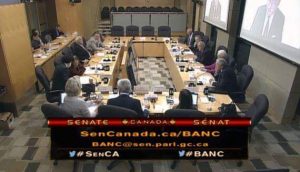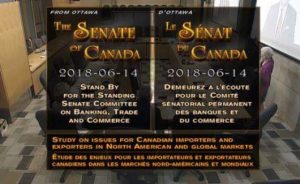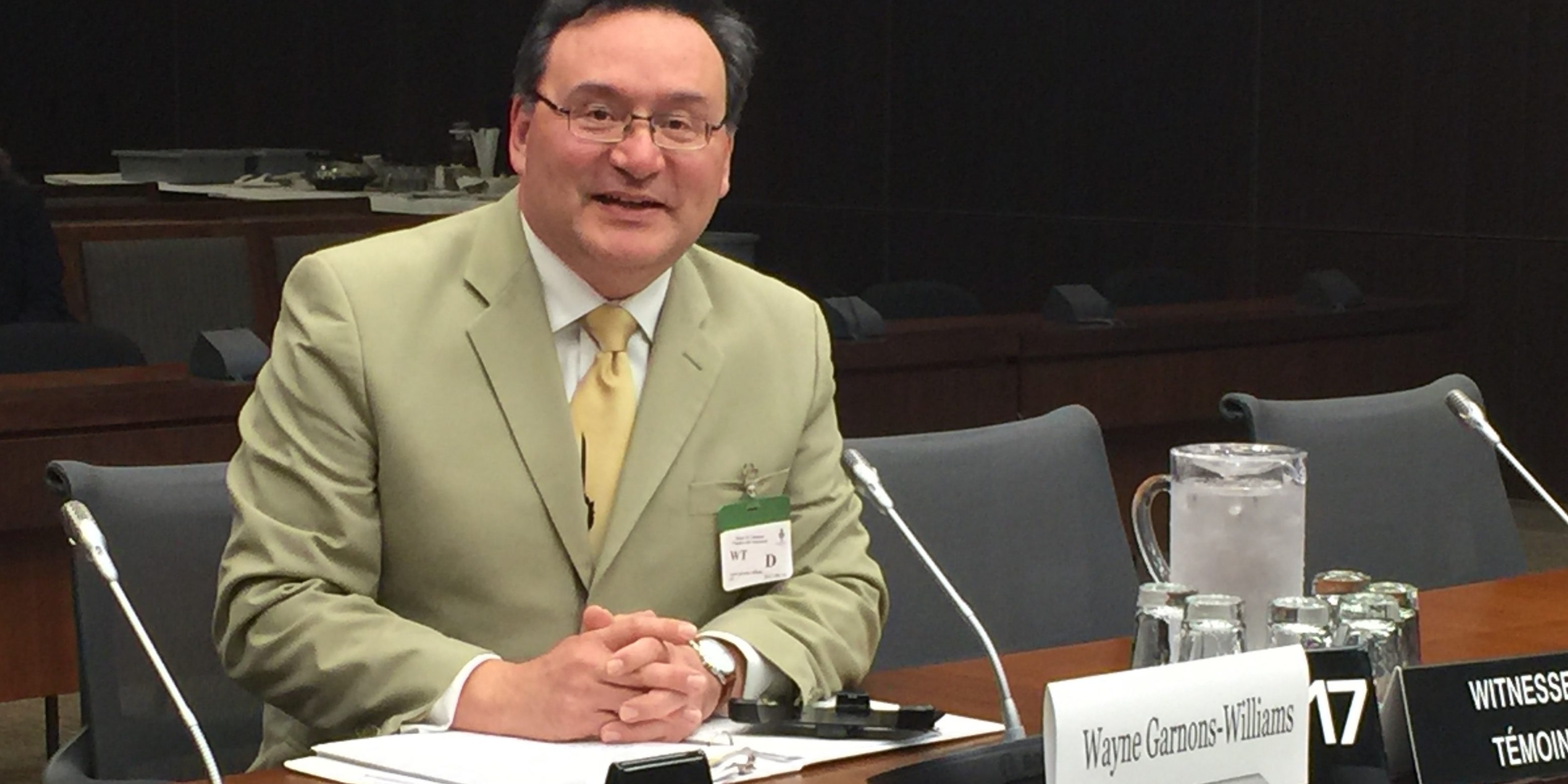
On June 14, 2018 IITIO Chair Wayne Garnons-Williams appeared before the Canadian Senate Committee on Trade, Banking and Commerce to present on the subject of emerging trade issues, in particular international Indigenous trade.
Before the Committee Wayne put forward the idea of the Federal government getting behind Indigenous economic sovereignty through global Indigenous trade and the development of Indigenous trade zones. Wayne asserted that such action would demonstrate that Canada is serious about reconciliation. Furthermore, economic reconciliation could in turn help Canada meet its 2030 United Nations Sustainable Development Goals.

Below is the complete five minute opening address:
Five minute opening address to the Senate Standing Committee on Trade, Commerce and Banking – by Wayne Garnons-Williams, Chair of IITIO
Core Message: Real reconciliation includes therRecognition of Indigenous economic rights – Including the Indigenous right to conduct international Inter-tribal trade and commerce.
we ask this Committee to recommend “Enabling legislation for international Indigenous trade, and Indigenous trade zones.”
International Inter-tribal Trade and Investment Organization (IITIO)
– What is IITIO?
IITIO is a non-profit NGO with Canadian head office in Ottawa, Canada. Every 6 months we organize an Indigenous Trade Mission and Conference that alternates between the U.S and Canada.
Given the brevity of time I refer the Committee to our terms of reference as found on our website.
We promote international Indigenous trade based on the following principles:
- Respect for Indigenous teachings
- Respect and preference for environmentally sustainable practices
- Inform, educate and encourage all parties to adopt these best practices
- Foster healthy Indigenous communities and more robust and stable Indigenous economies
Historically there is ample evidence of pre-European Indigenous trade. There is also ample evidence that Canada and the United States were countries founded on Trade with and between the original North American Indigenous Peoples.
Meaningful, full and informed Consultation is KEY
Currently Bill C-262 – United Nations Declaration on the Rights of Indigenous Peoples Act
May 30, 2018 passed through House of Commons – vote: 206 “for” to 79 “against”
As of June 1, 2018 Bill C-262 in second reading in the Canadian Senate
3 UNDRIP Articles most important:
Article 19 free, prior and informed consent
States shall consult and cooperate in good faith with the Indigenous peoples concerned through their own representative institutions in order to obtain their free, prior and informed consent before adopting and implementing legislative or administrative measures that may affect them. (emphasis added)
Article 29 (1) right to the conservation and protection of the environment
Indigenous peoples have the right to the conservation and protection of the environment and the productive capacity of their lands or territories and resources. (emphasis added)
Article 20 (1) right to maintain and develop their economic institutions & economic activities
Indigenous peoples have the right to maintain and develop their, economic institutions, and to engage freely in all their traditional and other economic activities. (emphasis added)
JULY 2017 – 10 Federal/ Indigenous Relationship Principles (item 6 & 8)
- Support for Free, Prior & Informed Consent
Meaningful engagement with Indigenous peoples aims to secure their free, prior, and informed consent when Canada proposes to take actions which impact them and their rights on their lands, territories, and resources.
- A Renewed Fiscal Relationship Promoting Economic Partnership and Resource Development
Reconciliation and self-government require a renewed fiscal relationship, developed in collaboration with Indigenous nations, that promotes a mutually supportive climate for economic partnership and resource development.
In previous NAFTA “Indigenous peoples were not present at the NAFTA negotiations but Canada inserted specific Language – “non-conforming measures” within NAFTA that exempt specific sectors from operation of NAFTA: Indigenous Carve Out – Article 800 Aboriginal Peoples
- This Agreement does not apply to any measure adopted or maintained by a party with respect to Aboriginal peoples. It does not affect existing Aboriginal or treaty rights of any of the Aboriginal Peoples of Canada under section 35 of the Constitution Act, 1982
In the current NAFTA negotiations the Indigenous Trade Chapter (part of Canada’s Progressive Trade Agenda), which IITIO developed with Global Affairs, has three parts:
- Recognize the important role of Indigenous peoples in trade, both historically and also in the context of facilitating sustainable growth and prosperity for Indigenous communities.
- Facilitate cooperative activities between the Parties and enhance the ability of Indigenous peoples to participate in and benefit from the opportunities created by this Agreement; and,
- Establish a committee to oversee the implementation of the chapter and consider matters of relevance to Indigenous peoples across the Agreement.
What are the possible trade issues that the Indigenous Trade Chapter can influence?
Traditional Knowledge; Intellectual Property; Inter-Tribal Trade; Free Passage crossing (Jay Treaty Principles); Market Access; Agriculture; Rules of Origin; Dispute Settlement;
Sustainable Development; Inter-tribal/ international investment; Procurement; Financing; Labour/ HR
NAFTA negotiations have recently stalled but Canada has presented the Indigenous Trade Chapter to other like-minded nation-states that have Indigenous Peoples (New Zealand and Peru being but two examples)
Peru in the Canada-Mercosur trade negotiations has expressed “interest and curiosity” in Canada’s Indigenous Trade Chapter.
Pacific Alliance Negotiations – Canada tabled (put forward) the Indigenous Trade Chapter with New Zealand, and New Zealand at the last round of discussions tabled their own New Zealand version of an Indigenous Trade Chapter.
How can the Senate help empower Indigenous-led Economic Prosperity for Indigenous Peoples?
Answer: Recommend “Enabling legislation” for international Indigenous Trade and the establishment of Indigenous Trade Zones
As Justice Murray Sinclair, Chair of the Truth & Reconciliation Commission, stated in his Final Report (2015):
Reconciliation calls for federal, provincial, and territorial action.
Reconciliation calls for national action.
The way we govern ourselves must change.
Laws must change.
Policies and programs must change.
The way we do business must change.
Thinking must change.
The way we talk to and about each other must change.
All Canadians must make a firm and lasting commitment to reconciliation to ensure that Canada is a country where our children and grandchildren can thrive.
Real reconciliation includes the recognition of Indigenous economic rights – including the Indigenous right to conduct International Inter-tribal trade and commerce.
I ask this Committee to recommend “Enabling legislation” for
- International Indigenous trade
- Indigenous trade zones

For additional information on IITIO’s Senate submissions for to: https://sencanada.ca/en/Content/Sen/Committee/421/BANC/54178-e






